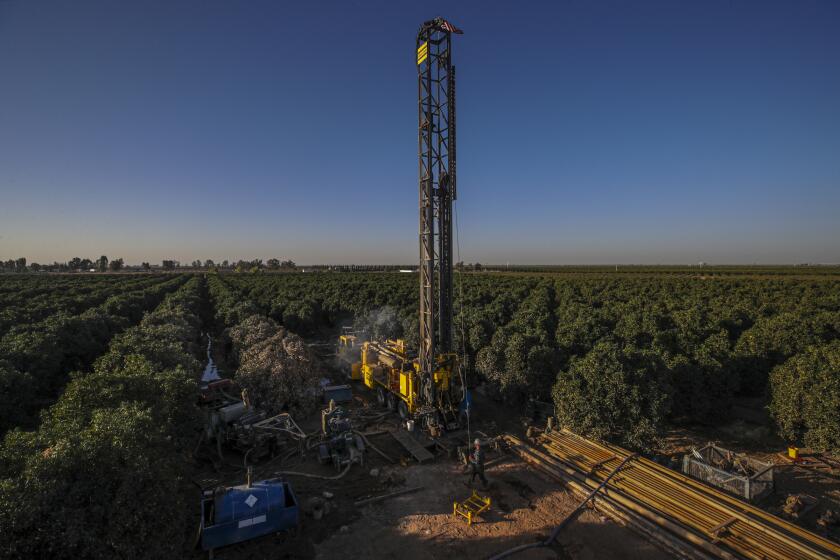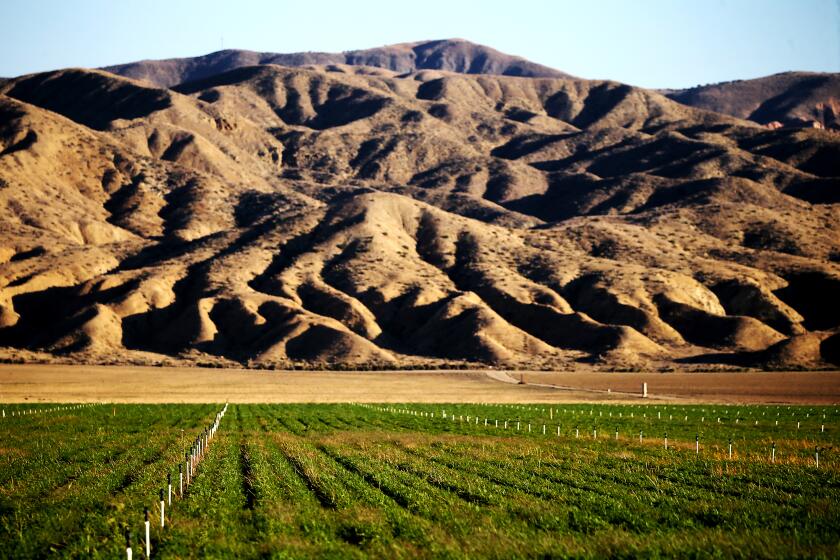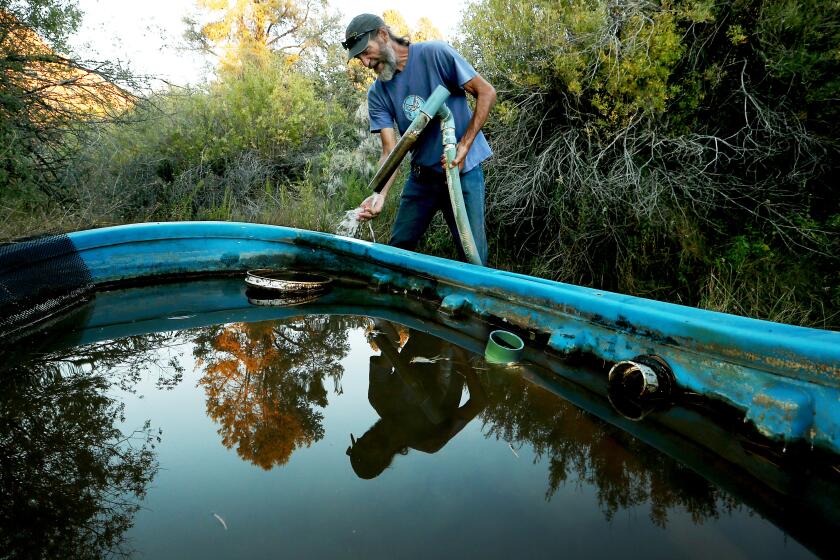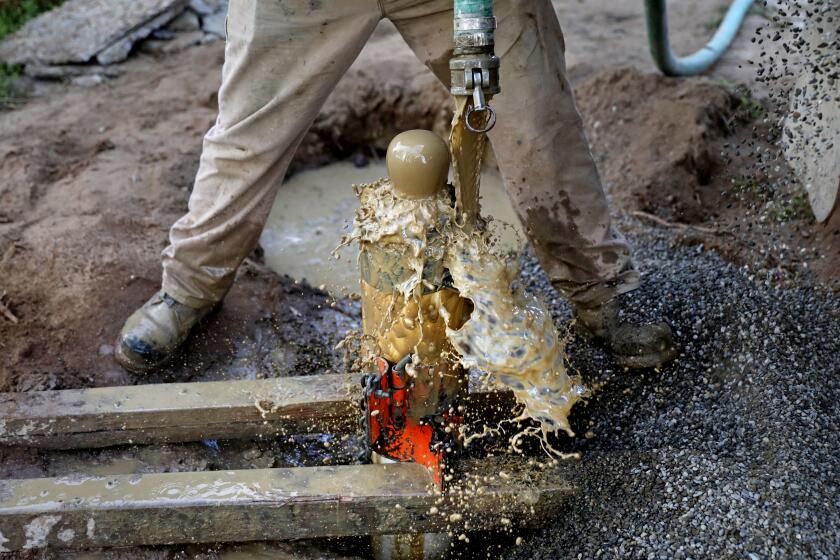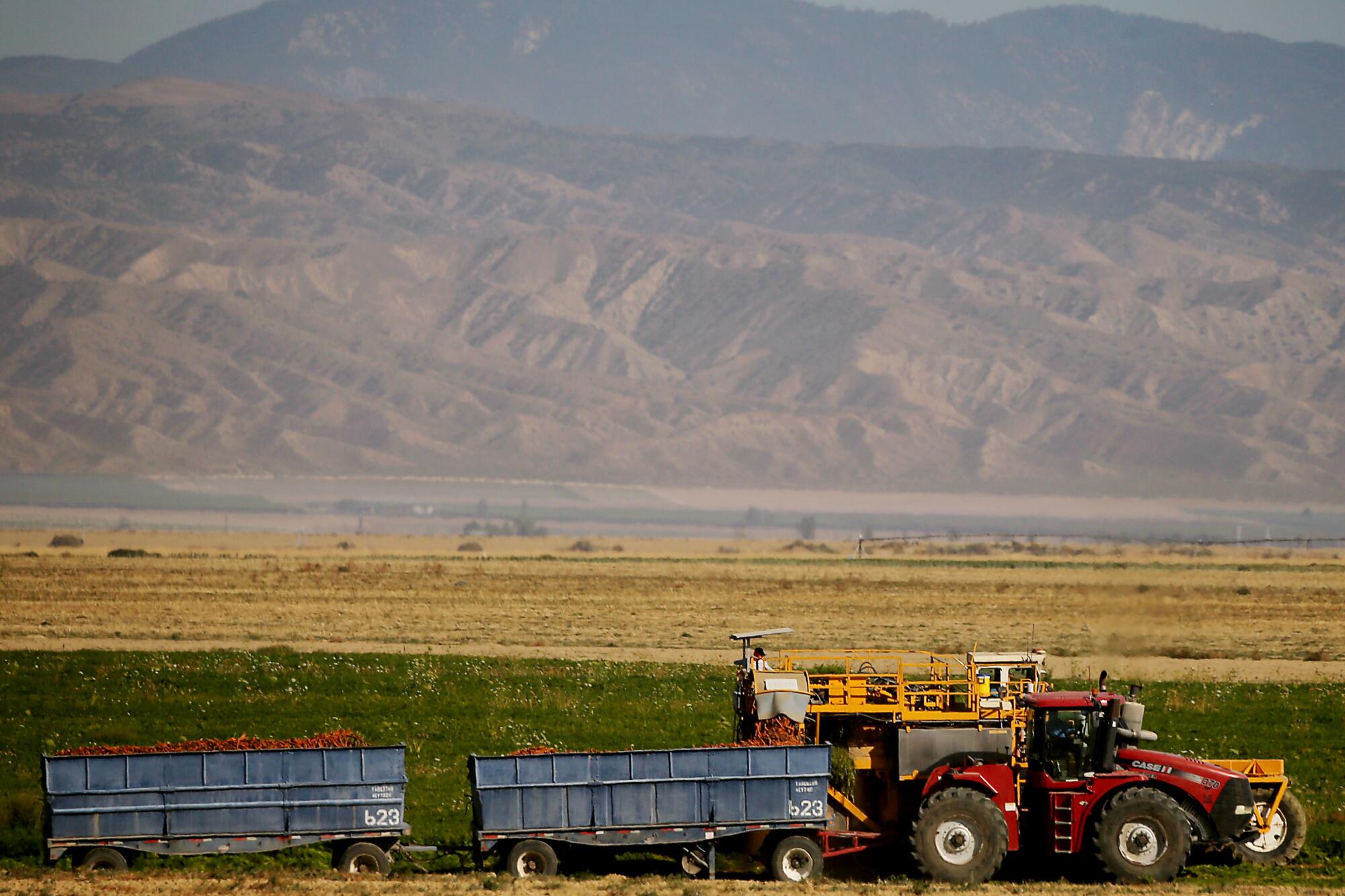
- Share via
NEW CUYAMA, Calif. — A lunch of pozole, chips and homemade salsa awaited a group of residents — including ranchers, farmers and owners of stores and restaurants — who gathered at folding tables in a community center to discuss a subject they are deeply concerned about: their declining groundwater.
The meeting in late June offered a chance for people to share their fears not only with neighbors, but with three visiting state legislators and a high-ranking water official from Sacramento.
“We are an engaged community,” said Lynn Carlisle, executive director of the Cuyama Valley Family Resource Center. “We’re a committed community. But we need help.”
The Cuyama Valley north of Santa Barbara is one of the areas of California where groundwater levels have been rapidly dropping, and where water continues to be heavily pumped to irrigate thousands of acres of farmland.
Like other regions, the Cuyama Valley has developed a state-mandated plan to address overpumping under California’s groundwater law, the Sustainable Groundwater Management Act. But while that plan is just starting to be implemented, disagreements over addressing the water deficit have led to a bitter legal fight.
Aggressive and impactful reporting on climate change, the environment, health and science.
A group of agricultural landowners in 2021 sued other property owners throughout the valley, asking a judge to determine how water rights should be divided. That case, called a water adjudication, sparked an outpouring of opposition and prompted residents to organize a boycott of carrot-growing companies that are the valley’s biggest water users. Participants have put up signs and banners reading “Boycott Carrots” and “Stand with Cuyama Against Corporate Greed.”
As the meeting began, some residents said the court case is saddling them with thousands of dollars in legal bills. Others said they fear the lawsuit could undermine the parallel process of limiting pumping under the Sustainable Groundwater Management Act, or SGMA.
“We know that SGMA is not perfect,” Carlisle said. “We want it to work.”
She said residents organized the meeting to tell legislators how the groundwater law is playing out, and “how it is now being challenged and potentially compromised.”
Those attending included state Sen. Monique Limón (D-Goleta), Assemblymember Gregg Hart (D-Santa Barbara) and Sen. Melissa Hurtado (D-Sanger).
Brenton Kelly, a community facilitator, said groundwater levels have dropped about 500 feet in part of the valley over the last half-century. He pointed to data showing “a consistent extraction of more than twice the natural recharge.”
The local plan calls for cutting water use by as much as two-thirds by 2040. But five years into its implementation, Kelly said, there haven’t yet been substantial reductions in pumping.
On lunch tables decorated with olive branches, organizers placed a packet of papers with numbers and graphics. A color-coded map marked areas of rapid depletion in red and orange. It read: “The big pumpers are pumping us dry.”
“We have the power dynamics of essentially David and Goliath, where we have a couple of powerful entities that are in control,” Kelly said. “And then we have a disadvantaged community that’s trying to preserve its natural resources.”
He was referring to two of the world’s largest carrot-growing companies, Grimmway Farms and Bolthouse Farms, as well as other companies that lease them farmland. The two farming companies dropped out of the lawsuit last year, while other landowning companies stayed on as plaintiffs in the case, which is pending in Los Angeles County Superior Court.
Those who organized the meeting said representatives of the companies weren’t invited.
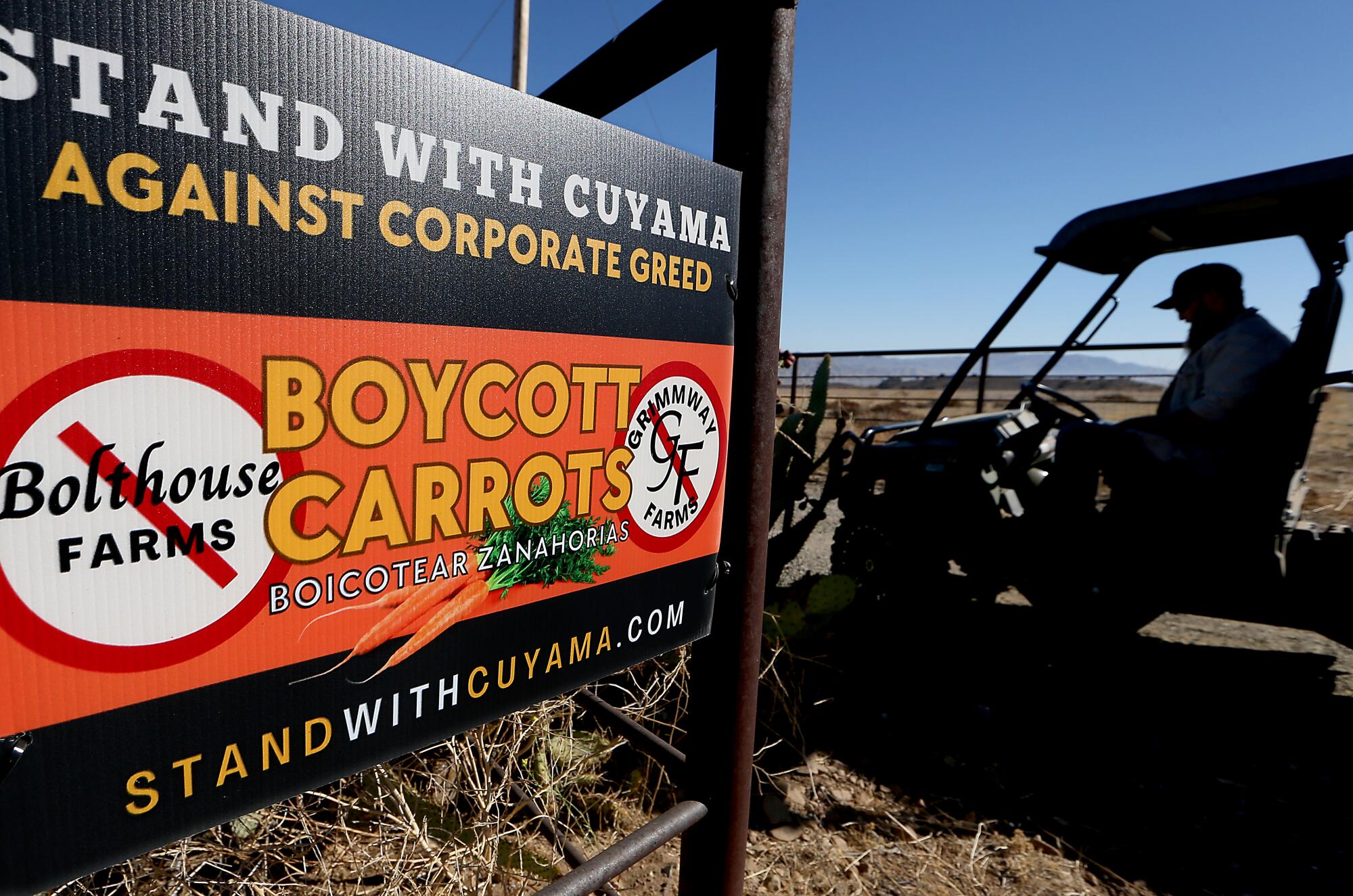
Ella Boyajian, who helped organize the boycott, said many people saw the companies’ lawsuit as an unfair attempt to impose cutbacks on others, and an affront to the tight-knit community’s collaborative values.
She said the lawsuit seems “adversarial” to the aims of the state groundwater law.
“Now we have adjudication, which is encouraging everybody’s self interest,” Boyajian said. “And we are all fighting for our little slice of the pie, the groundwater.”
Groundwater depletion is worsening in many of the world’s farming regions. But a global study also found that some efforts are helping to boost aquifers.
The case has prompted many in the community to hire lawyers. Boyajian said for some, the mounting bills are bringing financial trouble, forcing them to sell vehicles or delay retirement plans.
Even the local school district was forced to hire a lawyer, and Supt. Alfonso Gamino said the legal bills have reached more than $28,000.
Dave Lewis, a farmer who grows pistachios and lavender, said he and other small growers are struggling with as much as $50,000 in legal bills while also worrying that declining aquifer levels could leave them with dry wells.
“The water is declining really quick,” Lewis said. “It’s the big pumpers.”
He said he’s concerned water allocations will likely be calculated based on past usage, benefiting large growers while harming his small operation.
“I’m just a little guy,” he said. “So I rely on the government and agencies to protect me. And right now, I’m not feeling it.”
Pam Doiron, who owns a cattle ranch, said the lawsuit “has thrown us a staggering amount of overhead that is unsustainable.”
“If we have our water usage cut as a result of the adjudication, there will be no way to keep ranching here,” she said.
Doiron said it’s sad that while local residents were working toward a solution to reduce water use, the large Bakersfield-based growers were “working behind the scenes to undermine the groundwater sustainability agency and the livelihood of our Cuyama families.”
Grimmway Farms has said it’s not in favor of cutting the water rights of the school or small residential water users. The company withdrew from the case as a plaintiff in October.
Bolthouse Farms has said its decision to withdraw from the lawsuit in August was “driven by our commitment to sustainability,” and that the company is reducing water usage.
In California’s Cuyama Valley, companies pump vast amounts of water to grow carrots. When companies sued residents over water, the community launched a boycott.
One of the remaining plaintiffs is Bolthouse Land Co., a subsidiary of Bolthouse Properties, which split from Bolthouse Farms in 2005.
Daniel Clifford, vice president and general counsel for Bolthouse Properties, said a decision by other growers to challenge the basin’s boundaries “delayed the adjudication for almost a year and half and ended up costing every groundwater user, including the school district and water district, unnecessary time and money.” He was referring to pistachio growers and a large vineyard owned by a subsidiary of Harvard University’s investment company.
“Sustainability requires one basin-wide approach where all groundwater users share water cutbacks equally,” Clifford said in an email, adding that the company supports a “scientifically and legally appropriate” groundwater sustainability plan.
Robert Kuhs, a lawyer representing plaintiffs Diamond Farming Company, Lapis Land Company and Ruby Land Company, said the local groundwater agency voted to impose cutbacks on growers in the central part of the valley, and the lack of regulated pumping in other areas “inhibits sustainability and disproportionately impacts certain landowners.”
Kuhs said in an email that the companies sought the adjudication to have the court determine their water rights, and to ensure that “all commercial agricultural pumpers share in reductions.”
The Cuyama Valley is one of nine areas in the state where such cases are pending.
A legal fight over water spurred a boycott of carrots in California’s Cuyama Valley. Here’s what residents say about the boycott.
During the meeting, some residents accused carrot growers of over-irrigating with sprinklers and allowing water to run in ditches.
“They waste a lot of water because I’ve seen it,” farmworker Veronica Espinosa López said, speaking in Spanish. “I think there should be management, for them as well as for us in the community.”
She also expressed concern that growers have been hiring local farmworkers for shorter periods in recent years, leaving them with less income.
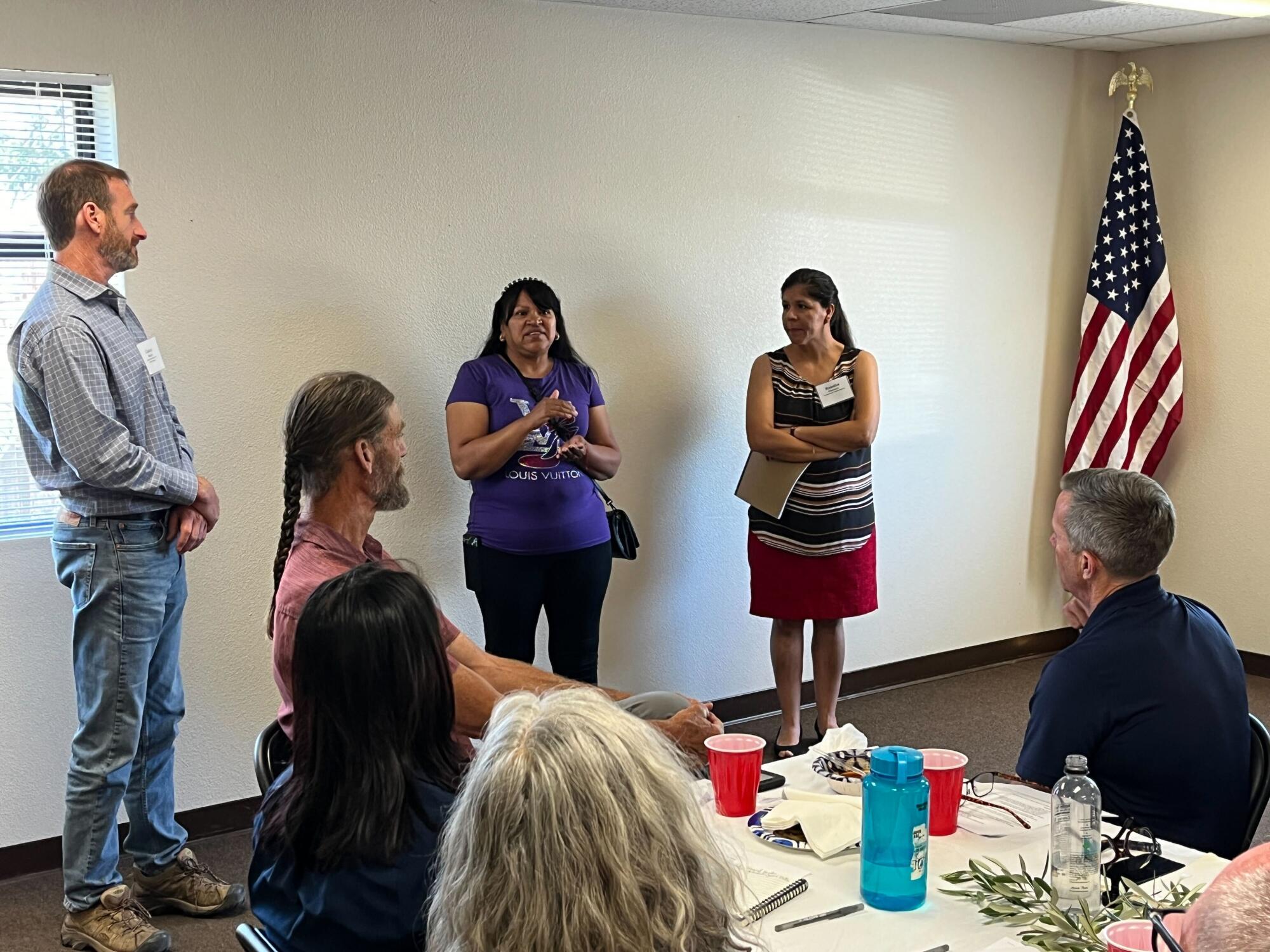
Longtime resident Roberta Jaffe, who dry-farms wine grapes on a five-acre farm, said that in past cases, water allocations have often been granted based on historical usage, “which means the largest pumpers are going to gain the most,” while small farmers who have been conserving will likely be penalized.
During the discussion, farmer Jim Wegis pointed at state water official Paul Gosselin and asked: “We presented a plan. You made adjustments to it. … Are you going to help support it when it goes to court?”
“That’s a loaded question,” Gosselin replied, eliciting laughter from around the room.
“We’re tracking a number of these adjudications very closely, for a variety of reasons,” Gosselin said, with the goal of preserving “what was the promise of SGMA about local control and bringing basins into balance.”
California water officials backed a bill to impose restrictions on where wells can be drilled, seeking to protect drinking water sources. Lawmakers rejected it.
The law’s implementation is now entering its most difficult period, he said.
“This is where the rubber is meeting the road,” Gosselin said. “And you’re all sort of at the tip of the spear, involved in this change that’s going to profoundly change how water is managed.”
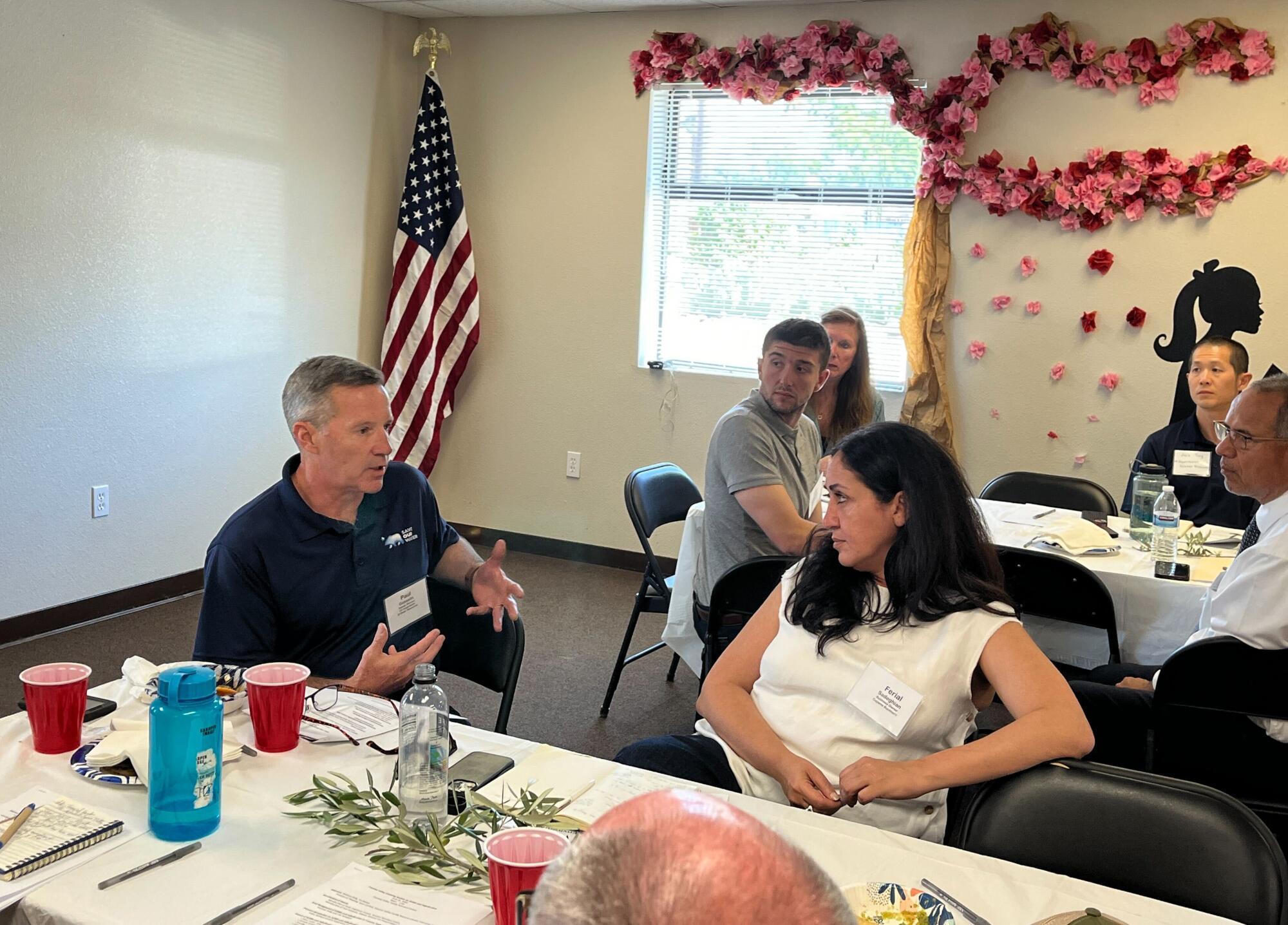
The legislators said they want to help work on solutions.
“I think we are faced with a really difficult decision, that a policy did this — a policy that was meant to help, and a policy that can help,” Limón said.
“And so we, I think, are going to take this back to figure out how we need to correct the policy,” she said. “We are walking out with a profound sense of the challenges that are in front of you.”

